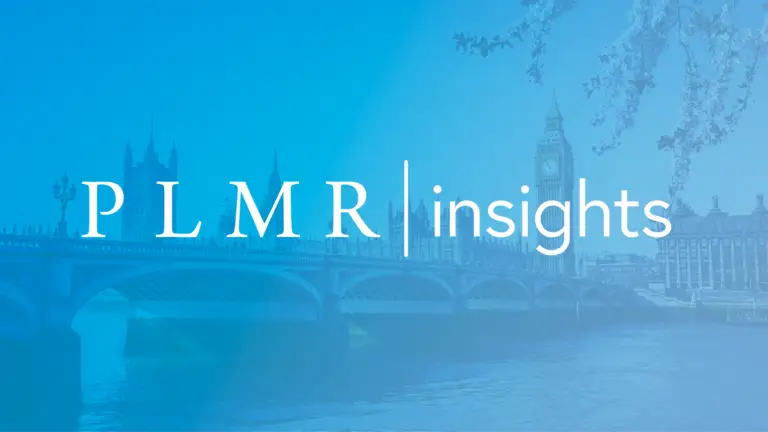The Chancellor of the Exchequer, Rishi Sunak presented the Spring Statement to the House of Commons earlier today, below we set out the key moments from his speech and Labour’s response, analysis of the politics and all the announcements made today. PLMR will be providing further sector-specific insights over the next few days.
The Chancellor will be doing the first ever phone-in following an economic statement on LBC at 7pm today.
Political Analysis
The Chancellor’s speech was made with one eye on the impending challenge to household income and another on the next General Election, which the Chancellor indicated is likely to be in 2024. Sunak’s statement broadly covered three areas – tackling the cost-of-living crisis, remaining hawkish on government finances and a plan to cut taxes.
- Tackling the cost-of-living crisis
Today’s Spring Statement was delivered against the news that inflation is now running at 6.2%, the highest since 1992. The Office for Budgetary Responsibility (OBR) estimate the potential for the largest fall in disposable incomes since records began in 1956.
The government is fully aware that the cost of living will be the central issue at the forefront of voters’ minds both in the upcoming locals and the next general election and that it needs to react accordingly.
The Chancellor set out to address this with three immediate measures, a fuel duty cut by 5p, a full cut to VAT on green home improvements and a doubling of the House Support Fund for most vulnerable households.
The most significant “rabbit” offered in this area was the lifting of the National Insurance threshold. The changes will come into effect from July and were warmly welcomed by the Conservative benches. However, questions have been raised regarding how impactful it will be, with the Resolution Foundation and IFS stating that raising the NICs threshold mainly helps middle and top earners and not enough has been done for those on means tested benefits.
Overall, the measures provided enough for the Chancellor to be able to claim he is on the side of families but the lack of further targeted support – especially on energy bills – may be called into question in the months ahead.
- Remaining hawkish on government finances
“We should be prepared for the economy and public finances to worsen – potentially significantly“.
Sunak was adamant that MPs and the wider public be prepared for difficult economic circumstances following Russia’s invasion of Ukraine. The OBR has pointed to unusually high uncertainty around the outlook and downgraded forecasts for growth this year.
He also warned that inflation will place significant pressures on the public finances, with the UK expected to pay £83bn on debt interest in the coming year – this is four times more than last year and double the total annual budget of the Ministry of Defence.
As such, the Chancellor did not announce extra money for health, education and other public services ensuring he has a cushion for further fiscal challenges the UK will likely face this year. Sunak remains incredibly conscious of the impact Covid had on the government’s finances and is seeking to address the size of the state in the long-term.
- Plan to cut taxes
The cushion may also be a deliberate attempt to provide Sunak with more room to cut taxes ahead of the next general election – one of his main political objectives.
The second surprise announcement from Sunak’s speech was the commitment that the basic rate of income tax will be cut from 20p to 19p before the end of the Parliament, a big political vow for the Conservatives to head into the next election with (and Sunak a potential future leadership contest).
Although less headline grabbing, the Chancellor dedicated a large portion of his speech to addressing corporate taxes. He highlighted that the UK doesn’t invest enough and set out a series of reforms to be made at the next Budget to help support “capital, people and ideas” through a more effective tax system.
The Treasury will consult businesses on cutting tax to capital investment, the quality of the Apprenticeship Levy and the way that R&D tax credits work.
For all the rhetoric on tax cutting, this Government will still have the highest tax burden since the 1940s.
Overall, Sunak went further than expected on support for the cost-of-living crisis, but the statement also focused on the politics and business challenges of the next two years – focusing on relief for working families, a more effective model of business support and securing his legacy as a “tax cutting Chancellor”.
Opposition response
Shadow Chancellor Rachel Reeves argued that the statement was a missed opportunity to incorporate several policies which Labour have been calling for such as a windfall tax on oil and gas companies and a scrapping of the health and social care national insurance levy. As well as highlighting the cost of living crisis, Reeves highlighted concern around defence spending and said the Chancellor had not mentioned any reversal of the plans to reduce the army by 10,000.
The Shadow Chancellor called on the government to introduce a windfall tax on oil and gas companies and said such a tax would raise £3 billion. She argued this could fund VAT cuts and an expansion of the winter homes discount. Reeves said the Chancellor must provide further support for domestic energy efficiency and should help energy intensive manufacturing businesses who are severely affected by the energy price increases.
Highlighting the controversy over fraud from Covid support schemes, Reeves said over £11 billion was lost by the government to fraud which she said resulted in them ‘funding crime rather than fighting it.’ She finished by stating that “The Chancellor has failed to appreciate the scale of the challenge that we face.”
Read the full response by the Shadow Chancellor here.
The Small Print:
- Treasury Press Release:Chancellor announces tax cuts to support families with cost-of-living (link here)
- Speech: from Rishi Sunak (link here)
- Documents:full list (link here)
Key announcements:
Cost of living
- For the first time in 20 years, fuel duty will be cut by 5p until March 2023. It will come into effect 6pm tonight (23.03.22). The change is worth over £5 billion.
- The VAT rate for households installing solar panels, heat pumps, and insulation will be cut from 5% to 0% for the next 5 years. Wind and water turbines will also be zero rated. Sunak said the changes would mean a family would save £1000 on the installation of solar panels and energy bill savings of £300 a year.
- The Government will double the household support fund by £500 million to £1bn. Local authorities will receive the funding from next month.
National Insurance
- The planned health and social care national insurance levy will go ahead in April 2022.
- The National Insurance Contribution (NIC) threshold will increase by £3,000 instead of the planned rise of £300. This raises the NI threshold to £12,570, the same as the income tax threshold. The NICs threshold change represents a £6 billion tax cut for 30 million people, worth over £330 a year for employees.
Income tax
- The basic rate of income tax will be cut from 20% to 19% by 2024.
- The planned changes have been pushed to 2024 due to the current ‘uncertainty’ in the economy. This would be a £5 billion tax cut for 30 million people.
Business Investment
- The chancellor announced a new tax plan which would include several changes for tax for businesses which would be consulted on over the summer ahead of changes to be announced in the Autumn Budget.
- The Government will make changes to the research and development tax credits in an effort to boost UK productivity.
- The tax plan sets out tax options for businesses investing in research and innovation with final decisions to be set out in the Autumn Budget.
- The plan explores improved tax incentives for businesses offering vocational qualifications and training.
- Under the tax plan R&D tax credits would be reformed and expanded to include areas such as cloud computing, data, and pure maths. A decision will be made in the Autumn as to whether the R&D expenditure credit should be made ‘more generous.’
SMEs/business rates
- As previously announced, from next month, there will be a 50% year-long discount on business rates up to £110,000 for the retail, hospitality and leisure sectors.
- However, this is a decrease from the 100% business rate discount that hospitality premises received throughout the 2020/21 tax year for the first three months; and the 66% relief given for the remaining nine months.
- Existing financial support for businesses on mini-MBAs and digital software was reiterated.
The Employment Allowance (EA) will further increase to £5,000 from next month. In April 2020, the government increased the EA by £1,000 to £4,000 in total.




